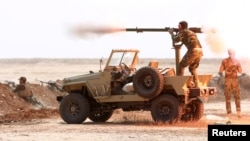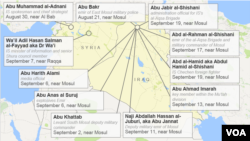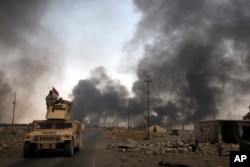One by one, key Islamic State terror group leaders are getting caught in the crosshairs of U.S. and coalition aircraft, and they are being removed from the battlefield as Iraqi forces prepare for a final assault on the IS-held city of Mosul.
Operation Inherent Resolve said Thursday that its airstrikes had killed 18 IS officials in the past 30 days, 13 of them in and around Mosul, "softening their grip" on Iraq's second-largest city.
The targeted killings have been, in part, the result of good intelligence that has allowed the U.S. to steadily target and eliminate "high-value" individuals, like IS spokesman and external operations planner Abu Muhammad al-Adnani and chief information officer Wa'il Adil Hasan Salman al-Fayyad.
Many of the more recent strikes have taken out lower-level but tactically important IS officials in Mosul, including three Chechen foreign fighter commanders, the deputy military emir, a military commander and a police commander, military officials said.
And the pace of such operations is likely to pick up as coalition-backed forces advance on the city.
"We're going to try to get after it and get after it quickly," Colonel John Dorrian, spokesman for Operation Inherent Resolve, told Pentagon reporters via a video link.
Intelligence surge
Dorrian also emphasized that a significant number of the 615 U.S. personnel being sent to Iraq for the battle for Mosul are intelligence experts, saying the deployment announced Wednesday could be seen as an intelligence surge.
"This additional capability is going to give us a lot of insight into Daesh networks, not just in Iraq and Syria, but also give insight into how they export terror around the world," he said, using the Arabic acronym for the terror group.
"We expect for our intelligence professionals, cooperating with the Iraqis, to get a treasure trove of intelligence information," Dorrian added.
U.S. military officials expect the amount of intelligence to rival or surpass the amount of information contained in the more than 20 terabytes of data recovered from computers and other devices after operations to expel IS from their hub in Manbij, Syria.
Some of that intelligence is thought to have allowed the U.S. to penetrate IS communications, enabling coalition forces to track several "high-value" officials before finally pulling the trigger on the strikes that killed Adnani and Fayad.
Additional intelligence recovered from Manbij has also been distributed to security services across Europe, though coalition officials refused to share additional details.
The U.S. is also hoping its intelligence efforts will benefit from improvements planned as part of the latest troop deployment to Iraq. Both Qayyarah Airfield West, south of Mosul, and Al Asad Airbase in Anbar province are expected to get upgrades to allow for more reconnaissance flights and also nighttime flight capabilities.
"Across the board, these forces are providing a lot of logistical capability, supply capability," Dorrian said. "Just supersized."






